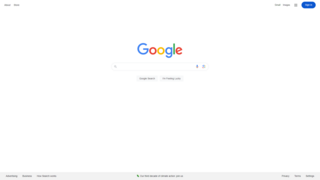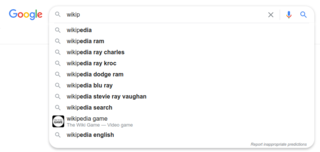Related Research Articles

Google Search is a search engine operated by Google. It allows users to search for information on the Internet by entering keywords or phrases. Google Search uses algorithms to analyze and rank websites based on their relevance to the search query. It is the most popular search engine worldwide.
Search engine optimization (SEO) is the process of improving the quality and quantity of website traffic to a website or a web page from search engines. SEO targets unpaid traffic rather than direct traffic or paid traffic. Unpaid traffic may originate from different kinds of searches, including image search, video search, academic search, news search, and industry-specific vertical search engines.

The terms Google bombing and Googlewashing refer to the practice of causing a website to rank highly in web search engine results for irrelevant, unrelated or off-topic search terms by linking heavily. In contrast, search engine optimization (SEO) is the practice of improving the search engine listings of web pages for relevant search terms.
A Googlewhack was a contest to find a Google Search query that returns a single result. A Googlewhack must consist of two words found in a dictionary and was only considered legitimate if both of the search terms appear in the result. Published googlewhacks were short-lived since when published to a website, the new number of hits would become at least two: one to the original hit found, and one to the publishing site, unless a screenshot was provided. Googlewhacks generally no longer exist due to changes in Google search indexing.

Owing to the dominance of the Google search engine, to google has become a transitive verb. The neologism commonly refers to searching for information on the World Wide Web, typically using the Google search engine. The American Dialect Society chose it as the "most useful word of 2002". It was added to the Oxford English Dictionary on June 15, 2006, and to the eleventh edition of the Merriam-Webster Collegiate Dictionary in July 2006.
Google AdSense is a program run by Google through which website publishers in the Google Network of content sites serve text, images, video, or interactive media advertisements that are targeted to the site content and audience. These advertisements are administered, sorted, and maintained by Google. They can generate revenue on either a per-click or per-impression basis. Google beta-tested a cost-per-action service, but discontinued it in October 2008 in favor of a DoubleClick offering. In Q1 2014, Google earned US$3.4 billion, or 22% of total revenue, through Google AdSense. In 2021, more than 38 million websites used AdSense. It is a participant in the AdChoices program, so AdSense ads typically include the triangle-shaped AdChoices icon. This program also operates on HTTP cookies.

PC Magazine is an American computer magazine published by Ziff Davis. A print edition was published from 1982 to January 2009. Publication of online editions started in late 1994 and continues as of 2024.
The Sandbox effect is a theory about the way Google ranks web pages in its index. It is the subject of much debate—its existence has been written about since 2004, but not confirmed, with several statements to the contrary.

A search engine is a software system that provides hyperlinks to web pages and other relevant information on the Web in response to a user's query. The user inputs a query within a web browser or a mobile app, and the search results are often a list of hyperlinks, accompanied by textual summaries and images. Users also have the option of limiting the search to a specific type of results, such as images, videos, or news.
Google Trends is a website by Google that analyzes the popularity of top search queries in Google Search across various regions and languages. The website uses graphs to compare the search volume of different queries over time.
Google and its subsidiary companies, such as YouTube, have removed or omitted information from its services in order to comply with company policies, legal demands, and government censorship laws.

Egosurfing is the practice of searching for one's own name, or pseudonym on a popular search engine in order to review the results. Similarly, an egosurfer is one who surfs the Internet for their own name to see what information appears. It has become increasingly popular with the rise of Internet search engines, as well as free blogging and web-hosting services. Though Google is the search engine most commonly mentioned when referring to egosurfing, other widely known search engines include Yahoo, Bing, and DuckDuckGo.

Cuil was a search engine that organized web pages by content and displayed relatively long entries along with thumbnail pictures for many results. Cuil said it had a larger index than any other search engine, with about 120 billion web pages. It went live on July 28, 2008. Cuil's servers were shut down on September 17, 2010, with later confirmations the service had ended.
Aardvark was a social search service that connected users live with friends or friends-of-friends who were able to answer their questions, also known as a knowledge market. Users submitted questions via the Aardvark website, email or instant messenger and Aardvark identified and facilitated a live chat or email conversation with one or more topic experts in the 'askers' extended social network. Aardvark was used for asking subjective questions for which human judgment or recommendation was desired. It was also used extensively for technical support questions. Users could also review question and answer history and other settings on the Aardvark website. Google acquired Aardvark for $50 million on February 11, 2010. In September 2011, Google announced it would discontinue a number of its products, including Aardvark.

DuckDuckGo is an American software company that offers a number of products intended to help people protect their online privacy. The flagship product is a search engine that has been praised by privacy advocates. Subsequent products include extensions for all major web browsers and a custom DuckDuckGo web browser.
Yandex Search is a search engine owned by the company Yandex, based in Russia. In January 2015, Yandex Search generated 51.2% of all of the search traffic in Russia according to LiveInternet.

The campaign for the neologism "santorum" started with a contest held in May 2003 by Dan Savage, a sex columnist and LGBT rights activist. Savage asked his readers to create a definition for the word "santorum" in response to then-US senator Rick Santorum's views on homosexuality and comments about same sex marriage. In his comments, Santorum had stated that "[i]n every society, the definition of marriage has not ever to my knowledge included homosexuality. That's not to pick on homosexuality. It's not, you know, man on child, man on dog, or whatever the case may be." Savage announced the winning entry, which defined "santorum" as "the frothy mixture of lube and fecal matter that is sometimes the byproduct of anal sex." He created a web site, spreadingsantorum.com, to promote the definition, which became a top internet search result, displacing the senator's official website on many search engines, including Google, Yahoo! Search, and Bing.

Google+ was a social network that was owned and operated by Google until it ceased operations in 2019. The network was launched on June 28, 2011, in an attempt to challenge other social networks, linking other Google products like Google Drive, Blogger and YouTube. The service, Google's fourth foray into social networking, experienced strong growth in its initial years, although usage statistics varied, depending on how the service was defined. Three Google executives oversaw the service, which underwent substantial changes that led to a redesign in November 2015.
Wavii was a Seattle startup founded by Adrian Aoun in 2008, and was subsequently acquired by Google, Inc. in April 2013. Wavii developed an iPhone app that allowed users to follow topics and receive short updates about them in their feed. This app was based on data produced by Wavii's proprietary technology, which used natural-language-processing and machine-learning approaches to convert content on the web into structured summaries of the stories they contained.
The DeGoogle movement is a grassroots campaign that has spawned as privacy advocates urge users to stop using Google products entirely due to growing privacy concerns regarding the company. The term refers to the act of removing Google from one's life. As the growing market share of the internet giant creates monopolistic power for the company in digital spaces, increasing numbers of journalists have noted the difficulty to find alternatives to the company's products. Some projects, such as ungoogled-chromium, primarily distinguish themselves from Google-maintained products by their lessened dependence on the company's infrastructure. It can be seen as part of a broader opposition to big tech companies, sometimes referred to as "techlash."
References
- ↑ "Googlism". pcmag.com. Archived from the original on 2008-02-21.
- 1 2 "About Googlism.com - Learn About Us & Our Team". www.googlism.com. Archived from the original on 2008-05-16. Retrieved 2007-02-12.